|
Books Should Be Free Loyal Books Free Public Domain Audiobooks & eBook Downloads |
|
|
Books Should Be Free Loyal Books Free Public Domain Audiobooks & eBook Downloads |
|
Fiction |
|---|
|
Book type:
Sort by:
View by:
|
By: Horatio Alger, Jr. (1832-1899) | |
|---|---|
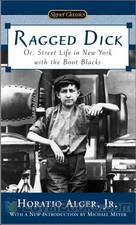 Ragged Dick
Ragged Dick
A fourteen year old homeless boy, Dick, tries to make an honest living in the streets of 1860s New York as a bootblack. He is determined to stay honorable, though he is tempted many times to easy pickings and a life of crime. When a regular customer is impressed by Dick's integrity and invites him to his mansion, this marks a turning point in the life of the young street-smart teenager. Ragged Dick by Horatio Alger Jr was first published in 1868. It represents a typical coming of age story in which a child attains the maturity of adulthood through circumstances in which important choices are made... | |
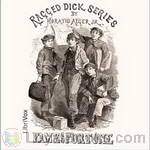 Fame and Fortune
Fame and Fortune
Richard Hunter, in this sequel to Ragged Dick, continues his way in the world through hard work and excellent morals. He, along with his friend Henry, continue their positive outlook as they try to advance their lives. But Dick soon finds envy and jealousy leads others to work against him. How will Dick react as he tries to strive forward while others conspire to hold him down? (Written by Barry Eads) | |
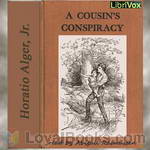 A Cousin's Conspiracy
A Cousin's Conspiracy
Ernest Ray is a young boy who sets out to reclaim the inheritance that was unjustly with held from his father and given to a cousin. (Introduction by Abigail Rasmussen) | |
 Timothy Crump's Ward
Timothy Crump's Ward
A poor family is surprised with an infant on their doorstep on New Year’s Eve with a note and monetary support requesting them to raise the child. Eight years later, the child is stolen and the family is put into more trouble trying to find her. This is a story of how love and good morals are reward with a fairy tale “happily ever after” ending. | |
 Rough and Ready OR Life Among the New York Newsboys
Rough and Ready OR Life Among the New York Newsboys
Join Rough and Ready for his adventure on the streets of New York City. Working as a newsboy, Rough and Ready tries to support himself and his sister on his meager earnings. Unfortunately, their stepfather is seeking to kidnap little Rose, getting an education is hard work, swindlers are trying to trick him out of his money, and thieves are planning nefarious deeds. Luckily for Rough and Ready, he makes some good friends along the way. Summary by Tori Faulder | |
By: Howard Overing Sturgis (1855-1920) | |
|---|---|
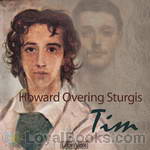 Tim
Tim
The first of only three novels by English author Howard Overing Sturgis, the son of wealthy American expatriates and a close friend of Henry James, Tim portrays a sensitive young boy’s affection for an older boy. (Introduction by Dorlene Kaplan) | |
By: Howard Pyle (1853-1911) | |
|---|---|
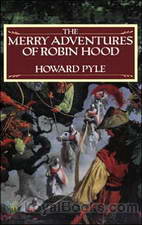 The Merry Adventures of Robin Hood
The Merry Adventures of Robin Hood
A modern day legend, Robin Hood is an archetypal hero of the common people who goes to great lengths to famously take from the rich and give to the poor. Luckily he is not alone in his mission, as his righteous views are shared by his band of Merry Men, a group of yeomen, and together they pursue an end to injustice and oppression. Set in medieval England, the tale begins with the introduction of a young archer, who is provoked into conflict and committing a crime against the formidable Sherriff of Nottingham and is immediately dubbed an outlaw... | |
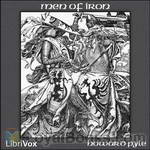 Men of Iron
Men of Iron
Men of Iron by Howard Pyle is historical fiction that transports us back to the 1400’s, a time of knighthood and chivalry. Myles Falworth is eight years old when news comes they must flee their home. His blind father is accused of treason. We see Myles grow up, train as a knight, and with perseverance, clear his father of any wrong-doing and restore their family name. | |
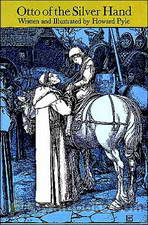 Otto of the Silver Hand
Otto of the Silver Hand
The story of little Otto, a gentle, peace-loving child born into the heart of turmoil and strife in the castle of a feuding robber baron in medieval Germany. (Summary by Arctura) | |
 Howard Pyle's Book of Pirates
Howard Pyle's Book of Pirates
Swashbuckling tales of legendary pirates, buccaneers, and marooners, terrors of the Spanish Main. | |
 The Garden Behind the Moon: A Real Story of the Moon Angel
The Garden Behind the Moon: A Real Story of the Moon Angel
David goes on a journey to the moon-garden where everything is beautiful and where he also meets Phyllis who is not like the other children in the garden. While he is allowed to play in this beautiful place for awhile, he at last finds out that he has been brought there to reveal his true mission, which is to find the Wonder-Box and the Know-All Book that is hidden in the Iron Castle and bring them back to earth. In order to find the Iron Castle, he must first find and tame the Black Winged Horse. Will he be able to succeed at the task given him? (Summary by Laura Victoria) | |
 Twilight Land
Twilight Land
The room was all full of twilight; but there they sat, every one of them. I did not count them, but there were ever so many: Aladdin, and Ali Baba, and Fortunatis, and Jack-the-Giant-Killer, and Doctor Faustus, and Bidpai, and Cinderella, and Patient Grizzle, and the Soldier who cheated the Devil, and St. George, and Hans in Luck, who traded and traded his lump of gold until he had only an empty churn to show for it; and there was Sindbad the Sailor, and the Tailor who killed seven flies at a blow,... | |
 Wonder Clock
Wonder Clock
"Four and twenty marvellous tales, one for each hour of the day," retold in a novel and entertaining manner by a master of the form. While drawing on German, English, and Scandinavian folk literature for many of his characters and plots, Pyle reworks the material in an imaginative way, crafting the tales in his own inimitable style. Equally engaging are the numerous woodcuts that accompany the stories and enliven the narrative. Read along and see the illustrations | |
 Rejected Of Men; A Story Of Today
Rejected Of Men; A Story Of Today
This is a setting of the story of Jesus as if it had occurred during early twentieth century America. The narrator's point of view is that of an outsider looking in at the story of Jesus. Howard Pyle (1853 - 1911) was an American illustrator and author. | |
By: Howard R. Garis (1873-1962) | |
|---|---|
 Sammie and Susie Littletail
Sammie and Susie Littletail
Once upon a time there lived in a small house built underneath the ground two curious little folk, with their father, their mother, their uncle and Jane Fuzzy-Wuzzy. Jane Fuzzy-Wuzzy was the nurse, hired girl and cook, all in one, and the reason she had such a funny name was because she was a funny cook. She had long hair, a sharp nose, a very long tail and the brightest eyes you ever saw. She could stay under water a long time, and was a fine swimmer. In fact, Jane Fuzzy-Wuzzy was a big muskrat, and the family she worked for was almost as strange as she was. (excerpt from text) | |
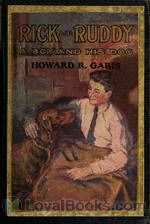 Rick and Ruddy
Rick and Ruddy
This delightful story is full of ups and downs involving a young boy and his dog, "a gift from the sea". The adventures range from playful antics to times of peril, and through it all, our protagonists (both human and canine alike) come through for each other as only a dog and his boy can! This adventurous and fun tale will bring you back to your own childhood memories...you and that special tail-wagger from the "good ol' days". | |
 Uncle Wiggily's Adventures
Uncle Wiggily's Adventures
Due to Uncle Wiggily's rheumatism being so very bad, Dr. Possum prescribes a journey to help him move around, have a change of air, and a good long bout of traveling to get more exercise. So Uncle Wiggily packs his valise and sets forth! | |
 Uncle Wiggily in the Woods
Uncle Wiggily in the Woods
Howard Garis, one of the most prolific children's writers of the 20th century, is credited with writing over 1500 Uncle Wiggily stories. In this collection, the loveable old rabbit stays close to home and visits woodland friends. | |
 Uncle Wiggily and Old Mother Hubbard
Uncle Wiggily and Old Mother Hubbard
Uncle Wiggily Longears, an old bunny gentleman now stricken with rheumatism and getting around with a cane, still is quite active. In these stories, he encounters a string of characters from Mother Goose's tales and has adventures that are not quite in keeping with her books!These gentle tales are 7 - 8 minutes each and quite suited to a nightly reading to a small child. (Intro by Mark F. Smith) | |
 Uncle Wiggily's Travels
Uncle Wiggily's Travels
This is the second of 79 Uncle Wiggily books published and contains another selection of bedtime stories from those originally published in the Newark Evening News every day except Saturday for over 40 years. Uncle Wiggily Longears is a loveable rabbit who suffers from rheumatism and has many woodland friends and innocent adventures. | |
 Curly and Floppy Twistytail (The Funny Piggie Boys)
Curly and Floppy Twistytail (The Funny Piggie Boys)
The adventures of two little pig boys and their mom and dad. "Once upon a time, not so very many years ago, in the days when there were fairies and giants and all things like that, there lived in a little house, on the edge of a wood, a family of pigs. Now these pigs weren't like the pigs, which perhaps you children have seen on most farms. No, indeed! They were just the nicest cleanest, sweetest pigs you ever dreamed of—not that pigs on a farm can't be clean, if they want to, but, somehow or other, no one seems to have time to see that they are clean." | |
By: Hugh Lofting (1886-1947) | |
|---|---|
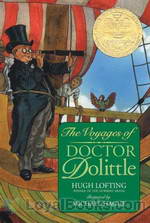 The Voyages of Doctor Dolittle
The Voyages of Doctor Dolittle
The delightfully eccentric Doctor Dolittle, rendered immortal on screen by the gifted Rex Harrison, has remained a firm favorite with generations of children ever since he made his debut in an earlier novel, The Story of Doctor Dolittle. In his second outing titledThe Voyages of Doctor Dolittle, the maverick physician takes on a new assistant, Tommy Stubbins. The story is structured as a first person account given by Tommy, who is now a very old man. The boy who was the son of the village cobbler first meets Doctor Dolittle when he takes a hurt squirrel to the doctor for treatment... | |
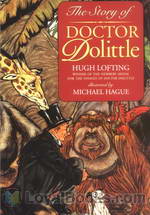 The Story of Doctor Dolittle
The Story of Doctor Dolittle
An adventurous children’s novel, The Story of Doctor Dolittle is the first book in the Doctor Dolittle series. The novel depicts the many adventures of Dr. John Dolittle as he learns the language of animals and takes on various feats including exotic travel, a dangerous encounter with pirates, and a mission to set right from wrong. The novel begins with the introduction of Dr. John Dolittle, an animal lover and respected physician, who lives in the small English town of Puddleby-on-the-Marsh with his unmarried sister... | |
By: Hugh Walpole (1884-1941) | |
|---|---|
 Jeremy
Jeremy
With affectionate humor, Mr. Walpole tells the story of Jeremy and his two sisters, Helen and Mary Cole, who grow up in Polchester, a quiet English Cathedral town. There is the Jampot, who is the nurse ; Hamlet, the stray dog ; Uncle Samuel, who paints pictures and is altogether 'queer’; of course, Mr. and Mrs. Cole, and Aunt Amy. Mr. Walpole has given his narrative a rare double appeal, for it not only recreates for the adult the illusion of his own happiest youth, but it unfolds for the child-reader a genuine and moving experience with real people and pleasant things... | |
 Portrait Of A Man With Red Hair; A Romantic Macabre
Portrait Of A Man With Red Hair; A Romantic Macabre
Is the father insane or merely sadistic, a man entombed in a spirit of malevolence? This 1925 novel by a perceptive observer explores the territory exceptionally.- Summary by david wales | |
By: Ida Coe and Alice Christie (1876-?) | |
|---|---|
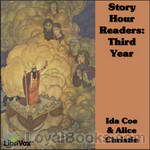 Story Hour Readers: Third Year
Story Hour Readers: Third Year
Short and sweet stories for children from the 19th century. The stories were compiled by two New York City teachers and were thought appropriate for third year children at that time. | |
By: Ignatius Loyola Donnelly (1831-1901) | |
|---|---|
 Atlantis: The Antediluvian World
Atlantis: The Antediluvian World
"Atlantis: The Antediluvian World is a book published during 1882 by Minnesota populist politician Ignatius L. Donnelly, who was born in Philadelphia, Pennsylvania during 1831. Donnelly considered Plato's account of Atlantis as largely factual and attempted to establish that all known ancient civilizations were descended from this supposed lost land. Many of its theories are the source of many modern-day concepts we have about Atlantis, like the civilization and technology beyond its time, the origins of all present races and civilizations, a civil war between good and evil, etc." | |
By: Irvin S. Cobb (1876-1944) | |
|---|---|
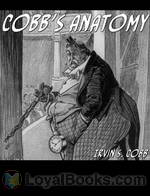 Cobb's Anatomy
Cobb's Anatomy
Irvin Shrewsbury Cobb was born on June 23, 1876. At seventeen years of age, he began writing for the Paducah Daily News, his hometown paper. At nineteen he became the managing editor; up to that point, our nation’s youngest. He worked as a columnist, a humorist and an author. But ‘horror,’ and ’short stories,’ are not why he is remembered. He is remembered because he was, and still is, funny. And although he is now dead–he died March 11, 1944–this work “Cobb’s Anatomy,” among others, has left an indelible mark upon mankind: a smile. | |
 One Third Off
One Third Off
Irvin Shrewsbury Cobb (June 23, 1876–March 11, 1944) was an American author, humorist, and columnist who lived in New York and wrote over 60 books and 300 short stories. Cobb has been described as “having a round shape, bushy eyebrows, full lips, and a triple chin. He always had a cigar in his mouth.” This book is a hilarious account of Cobb’s attempts at weight-loss. | |
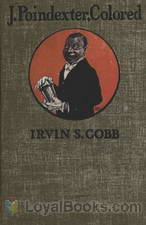 J. Poindexter, Colored
J. Poindexter, Colored
This comic novel relates the first-person adventures in New York City of Jefferson Poindexter, personal assistant to Cobb's famous Judge Priest, while the judge is vacationing abroad. (Introduction by Grant Hurlock) | |
By: Irving Bacheller (1859-1950) | |
|---|---|
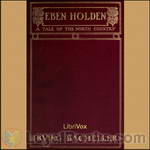 Eben Holden - A Tale of the North Country
Eben Holden - A Tale of the North Country
Eben Holden - A Tale of the North Country. Having lost both parents and his home in northern Vermont, orphan Willie Brower is taken in by Eben Holden, "Uncle Eb" who transports him westward to save him from being sent to an orphanage. Through the Adirondacks and into the St. Lawrence valley they travel. Eben is kind, happy, and loves to tell stories to the youngster, many of which were to shape the life and ideals of Willie during his life.This story follows Willie as a young orphan, later as a journalist, and finally as a soldier who enlists in the army at the outset of the American Civil War... | |
 Silas Strong
Silas Strong
Per the author: "The book has one high ambition. It has tried to tell the sad story of the wilderness itself—to show, from the woodsman's view-point, the play of great forces which have been tearing down his home and turning it into the flesh and bone of cities." But this story is much more than that. It revolves around Silas Strong and his distaste for the modernization and destruction of his beloved forest surroundings, and how it pleases him to teach younger folk how to appreciate that which has been given us... | |
By: Irving Sydney Dix | |
|---|---|
 Comet and Other Verses
Comet and Other Verses
A few years ago, while recovering from an illness, I conceived the idea of writing some reminiscent lines on country life in the Wayne Highlands. And during the interval of a few days I produced some five hundred couplets,—a few good, some bad and many indifferent—and such speed would of necessity invite the indifferent. A portion of these lines were published in 1907. However, I had hoped to revise and republish them, with additions of the same type, at a later date as a souvenir volume of verses for those who spend the summer months among these hills—as well as for the home-fast inhabitants... | |
By: Irwin Leslie Gordon (1888-1954) | |
|---|---|
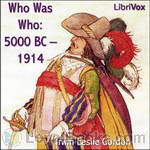 Who Was Who: 5000 BC – 1914
Who Was Who: 5000 BC – 1914
A short, humorous biography of famous people from 5000 BC to 1914. — S. McGaughey From the Introduction, “The editor begs leave to inform the public that only persons who can produce proper evidence of their demise will be admitted to Who Was Who. Press Agent notices or complimentary comments are absolutely excluded, and those offering to pay for the insertion of names will be prosecuted. As persons become eligible they will be included without solicitation, while the pages will be expurgated of others should good luck warrant.” | |
By: Isabella Alden (1841-1930) | |
|---|---|
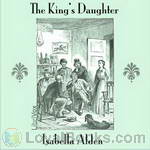 The King's Daughter
The King's Daughter
Dell Bronson has been reared in Boston by her refined uncle and aunt until, at age 18, she is called home by her father, a coarse tavern owner in Lewiston. As a daughter of the heavenly King, she strives to honor her heavenly Father by wooing her earthly father to Christ and away from rum. Set in the era of the temperance movement of the 1800’s. Authored by Isabella M. Alden under the pen name “Pansy.” Third in the Ester Ried series. | |
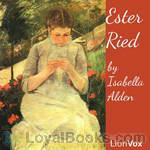 Ester Ried
Ester Ried
Authored by Isabella M. Alden under the pen name “Pansy.” Ester Ried’s life is a dull monotony of toiling at her family’s boardinghouse. She’s overworked, jealous and cranky, a poor example of a Christian to her family and associates. She awakens to a new attitude and commitment due to an extended visit with her cousin. | |
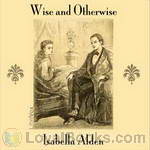 Wise and Otherwise
Wise and Otherwise
Immature Mr. Tresevant (from “The King’s Daughter”) comes to Newton with his spoiled wife to be the new pastor of the church attended by Dr. and Mrs. Douglass, Mr. and Mrs. Sayles, and Mr. and Mrs. Tyndall (from “Ester Ried” and “Julia Ried”), boarding with Jerome and Abbie Sayles. Authored by Isabella M. Alden under the pen name “Pansy.” Fourth in the Ester Ried series. | |
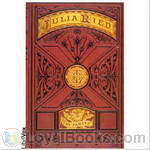 Julia Ried
Julia Ried
Authored by Isabella M. Alden under the pen name “Pansy.” Sequel to “Ester Ried.” Julia Ried must take a job as a bookkeeper in a factory to earn a living. The mistress of her boardinghouse influences her in a negative way, drawing her into a life and attitude displeasing to God. Will her family and friends be able to convince her stand up for what’s right? | |
 Four Girls at Chautauqua
Four Girls at Chautauqua
Authored by Isabella M. Alden under the pen name “Pansy.” First in the Chautauqua Girls series. Four friends – spoiled, quirky Ruth; fun-loving and mischievous Eurie; poor, independent and brainy Marion; and meek, approval-seeking Flossy – attend Chautauqua on a lark, and their lives are changed forever. (Chautauqua is an adult education movement in the United States, highly popular in the late 19th and early 20th centuries. The Chautauqua brought entertainment and culture for the whole community, with speakers, teachers, musicians, entertainers, preachers and specialists of the day.) | |
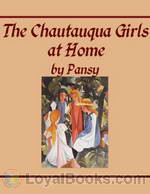 The Chautauqua Girls at Home
The Chautauqua Girls at Home
Sequel to Four Girls at Chautauqua. Ruth, Flossy, Eurie, and Ruth return home as new Christians, eager to begin working. Their new faith clashes with their old lives, which they must overcome, as well as the prejudices of friends and acquaintances. | |
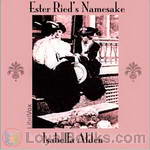 Ester Ried's Namesake
Ester Ried's Namesake
Ester Ried Randall tries to live up to her parents’ expectations and the name she’s been given, but her religion is a chore. Will she learn the lesson of faith that Ester did? Fifth and final book in the Ester Ried series. Authored by Isabella M. Alden under the pen name “Pansy.” | |
 Judge Burnham's Daughters
Judge Burnham's Daughters
Fifth in the Chautauqua Girls series. Ruth Erskine Burnham has helped raise her husband’s two daughters, but all have rejected her faith and values. The constant pressure to compromise has weakened her walk and made her life miserable. Her one comfort is her somewhat sickly 5 year old son. Will she return to the strong faith of her young womanhood, and will her family finally follow? | |
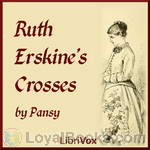 Ruth Erskine's Crosses
Ruth Erskine's Crosses
Third book in the Chautauqua Girls series. Written by Isabella Alden under the pseudonym “Pansy.” Ruth’s father brings home a wife and daughter, after 18 years, that Ruth had never known about. Suddenly she is no longer the queen of her home. And what’s worse, the new mother and sister are rude and antagonistic. How will Ruth bear this cross? | |
By: Isabella L. Bird (1831-1904) | |
|---|---|
 A Lady's Life in the Rocky Mountains
A Lady's Life in the Rocky Mountains
Isabella Bird began travelling while in her early twenties to help alleviate illness that had plagued her since childhood. She was a single woman in her early forties when she made her treck through the Rocky Mountains. A Lady’s Life in the Rocky Mountains details this fascinating account of her travels through a series of letters written to her sister, Henrietta. These letters are filled with beautiful, vivid descriptions of the scenery, the people she encountered, the way of life, and a mountain man named Jim Nugent, that was as rough as they come, but a complete gentleman with Ms... | |
By: Isabella M. Alden | |
|---|---|
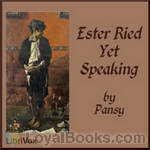 Ester Ried Yet Speaking
Ester Ried Yet Speaking
Authored by Isabella M. Alden under the pen name “Pansy.” Fourth in the Chautauqua Girls series. Alfred Ried (brother of Ester Ried from that series) wants to help the hundreds of poor street boys in his city to come to faith and improve their conditions, but is discouraged and overwhelmed with the task. Enter Flossy (Shipley) Roberts, a willing worker who focuses on 7 such boys and especially on one. | |
By: Isabella Varley Banks (1821-1897) | |
|---|---|
 Manchester Man
Manchester Man
Jabez Clegg, the Manchester man, floats into this historical novel in 1799, carried downstream by the River Irk in flood. Jabez's rise to commercial success mirrors the rise of the city at the heart of the industrial revolution. Mrs George Linnaeus Banks (nee Isabella Varley) weaves a web of historical fact and fiction in a fast-paced story built around the rivalry between the Jabez and his nemesis Laurence Aspinall, and the fate of Augusta Ashton, who is loved by both but loves only one. An entertaining fictional journey through the early 19th century history of the city of Manchester, the book also has serious points to make about women's choices and domestic violence. | |
By: Israel Zangwill (1864-1926) | |
|---|---|
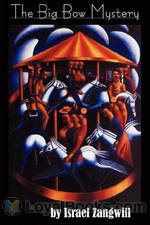 The Big Bow Mystery
The Big Bow Mystery
Regarded as the first full-length locked room mystery, the novel focuses on a murder that has occurred inside a locked room, with no clear indication as to the weapon used, the perpetrator of the horrendous crime, or a possible escape route. Needless to say, The Big Bow Mystery has all the elements necessary to engage its audience and encourage them to look between the lines in an attempt to unravel the complex murder. Set in Bow, east London, the novel opens when Mrs. Drabdump, a widow who rents out rooms, panics when one of her lodgers does not respond to her fervent attempts to wake him... | |
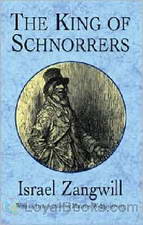 The King of Schnorrers
The King of Schnorrers
Manasseh da Costa is a schnorrer (beggar) who lives on the charitable contributions of the Jews of late 18th-century London. But Manasseh is far from being a humble panhandler for, as every schnorrer knows, supporting the poor is a commandment from God (a mitzvah) not just a favour. And as the descendant of Portuguese Jews who had lived in England for many generations, Manasseh is the social superior of those newly arrived from Eastern Europe (called ‘Tedesco’), even his wealthy patron Joseph Grobstock... | |
 Grotesques and Fantasies
Grotesques and Fantasies
A set of often funny, sometimes tragic stories by Israel Zangwill. Most famous for his scathingly accurate portrayals of the Jewish ghetto, these stories have a wider stage, poking fun at social conventions and society itself, both high and low. The real and the fantastic collide to produce a world uniquely Zangwill's.These are the tales of figures as diverse as a pantomime dragon, an excellent butler, a man living his life in the wrong order and a Jewish maiden who knows exactly what she is worth... | |
By: Ivan Goncharov (1812-1891) | |
|---|---|
 Oblomov
Oblomov
Oblomov is the best known novel by Russian writer Ivan Goncharov, first published in 1859. Oblomov is also the central character of the novel, often seen as the ultimate incarnation of the superfluous man, a symbolic character in 19th-century Russian literature. Oblomov is a young, generous nobleman who seems incapable of making important decisions or undertaking any significant actions. Spoiled as a child to the point of not even being able to put on his own socks, Oblomov is unprepared to deal with the smallest difficulty of adult life... | |
 Common Story
Common Story
Alexander Fedoritch Adouev is the naïve, pampered son of Anna Pavlovna, a provincial landowner. He decides to go off to Saint Petersburg, not only to make his mark upon society but also to fulfill his two rosy romantic dreams of becoming a great writer and finding a great love. He is taken under the reluctant wing of his uncle, Piotr Ivanitch Adouev, a pragmatic, hard-headed businessman who scorns everything romantic and tries to cure Alexander Fedoritch of his sentimental, youthful illusions. The... | |
By: Ivan S. Turgenev | |
|---|---|
 First Love
First Love
The title of the novella is almost an adequate summary in itself. The “boy-meets-girl-then-loses-her” story is universal but not, I think, banal – despite a surprise ending which notoriously turns out to be very little of a surprise. “First Love” is given its originality and poignancy by Turgenev’s mastery of the piercing turning-point (akin to Joyce’s “epiphanies”) that transforms the character’s whole being, making a tragic outcome inevitable. Even the nature symbolism is rescued from triteness by lovely poetic similes – e... | |
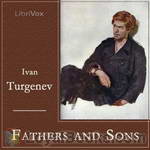 Fathers and Sons
Fathers and Sons
The fathers and children of the novel refers to the growing divide between the two generations of Russians, and the character Yevgeny Bazarov has been referred to as the “first Bolshevik”, for his nihilism and rejection of the old order. Turgenev wrote Fathers and Sons as a response to the growing cultural schism that he saw between liberals of the 1830s/1840s and the growing nihilist movement. Both the nihilists (the “sons”) and the 1830s liberals sought Western-based social change in Russia... | |
 The Diary of a Superfluous Man
The Diary of a Superfluous Man
Turgenev’s shy hero, Tchulkaturin, is a representative example of a Russian archetype – the “superfluous man”, a sort of Hamlet not necessarily dignified with the title Prince: an individual of comfortable means leading a dreary existence, without purpose and led on by events which may, as in this story, engulf him. The novella takes the form of a diary started by Tchulkaturin in the shock of being diagnosed as having a terminal illness. The journal entries cover a period of two weeks, leading to his death... | |
 On the Eve
On the Eve
On the Eve appeared in 1860, two years before Fathers and Sons, Turgenev's most famous novel. It is set in the prior decade (by the end of the novel, the Crimean War (1853-56) has already broken out. It centers on the young Elena Nikolaevna Stakhov, daughter of Nikolai Arteyemvitch and Anna Vassilyevna Stahov. Misunderstood by both her parents (Nikolai Artemyevitch is at least as interested in his German mistress as in members of her family) she is on friendly terms with both the would-be professor Andrei Petrovitch Bersenyev and the rising young sculptor Pavel Yakovitch Shubin, both of whom might be -- or might not be -- in love with her... | |
By: Izaak Walton (1593-1683) | |
|---|---|
 The Compleat Angler
The Compleat Angler
The Compleat Angler is a celebration of the art and spirit of fishing in prose and verse. Walton did not profess to be an expert with the fly, but in the use of the live worm, the grasshopper and the frog "Piscator" could speak as a master. There were originally only two interlocutors in the opening scene, "Piscator" and "Viator"; but in the second edition, as if in answer to an objection that "Piscator" had it too much in his own way in praise of angling, he introduced the falconer, "Auceps," changed "Viator" into "Venator" and made the new companions each dilate on the joys of his favourite sport. | |
By: J. C. Ryle (1816-1900) | |
|---|---|
 Two Bears, and Other Sermons for Children
Two Bears, and Other Sermons for Children
”Let no one make you think that you are too young to serve God. That is not true. As soon as you know right from wrong, you are old enough to begin taking the right way. As soon as you are old enough to be punished for doing wrong, you are old enough to give your heart to God, and to follow Christ.” So Rev. Ryle speaks to children of all ages. He does not speak down to children, for even the littlest ones can understand great spiritual truths. Instead, he teaches them in simple language what it means to be a true follower of Jesus and challenges them to live a better life whatever their age by following Jesus’ example – messages we adults could profit from as well... | |
By: J. M. Barrie (1860-1937) | |
|---|---|
 Peter Pan
Peter Pan
His name has become a metaphor for one who will never grow old. Peter Pan by JM Barrie is the story of a boy who remains a boy while the world around him changes. Sir James Mathew Barrie was a Scottish playwright and novelist whose works were received with great critical and commercial success in the late nineteenth and early twentieth century. He discovered the main inspiration for his creative genius in his friendship (and later guardianship) with the children of Arthur and Sylvia Llewellyn-Davies... | |
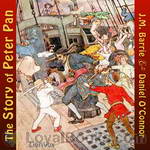 The Story of Peter Pan
The Story of Peter Pan
THE STORY OF PETER PAN RETOLD FROM THE FAIRY PLAY BY SIR J.M. BARRIE BY DANIEL O'CONNOR. Basically, Daniel O'Connor took the story from the original play, with the approval of Barrie, and shortened it into a book with music and beautiful illustrations. This shorter book was published before Barrie wrote the longer novel using the same plot and characters. | |
 Echoes of the War
Echoes of the War
Short stories with dramatic parts about civilian life in London during the First World War. Some humorous moments. By the author of "Peter Pan". | |